Lutheran AMBASSADOR



ne of the things we value most as a church body is the local congregation. The AFLC is not organized as a synod, nor does any group or body exercise any spiritual authority over any of our congregations. Your local church is subject only to the Word of God and the Holy Spirit. We emphasize the local congregation because we believe that is where God is at work.
The articles in this issue explore different aspects of life together in the local congregation. Alisha Kneeland writes on our call to live the Christian life together and the blessings this provides. She reminds us that congregational life is “a beautiful blueprint for life in his kingdom,” where we gather around his Word, bear with one another, and are shaped together into his likeness.
What happens in the congregation? Pastor David Graves writes an article about both spiritual gifts and the fruits of the Spirit in the context of the local congregation. Pastor Steve Snipstead teaches us about the means of grace, which are gifts given to the congregation to build and strengthen faith.

The pastor is an important part of our Christian life together in the congregation. Emily Raan looks at I Peter 5 to help us see our pastors as Godgiven shepherds who care for our souls. Peter writes to pastors of the Church: “Shepherd the flock of God that is among you, exercising oversight, not under compulsion, but willingly, as God would have you; not for shameful gain, but eagerly; not domineering over those in your charge, but being examples to the flock” (I Peter 5:2–3).
The deaconess is another biblical office that serves the local congregation. Pastor Brian Westerbur writes about the deaconess ministry at Bethel Free Lutheran in Grafton, N.D. Men and women have distinct roles in the congregation, and Bethel tasks deaconesses with bringing Christ’s love to the poor, suffering, widowed, and orphaned.
Finally, Kirstie Skogerboe writes an article in this issue on the public witness of the congregation. Jesus says in Matthew 5 we are the “salt of the earth,” and “the light of the world,” and “a city set on a hill.” Congregational life, according to the New Testament, is countercultural. Living sacrificially and lovingly bearing with one another goes against the grain of the world’s expectations.
Reflecting on our history of emphasizing the congregation, Loiell Dyrud writes, “Why is this kind of church organization so important? [Georg] Sverdrup and [Sven] Oftedal believed that when the congregation is free from synodical control without and free from pastoral domination within, then the Holy Spirit and the Word have a greater opportunity for creating a ‘living’ congregation. Though this kind of freedom can never guarantee spiritual life, neither is it likely to hinder spiritual growth. And spiritual life and spiritual growth were paramount to Sverdrup and Oftedal’s vision for the congregation. They believed the congregation is a living, spiritual organism to be modeled after the New Testament congregation as described in the Book of Acts, with no official church hierarchy governing it” (Roots of Freedom: The Association of Free Lutheran Congregations).
Life in the congregation is not perfect. We still deal with sin and conflict over issues both small and large. But walking together through the Christian life is better than walking alone, and as the body of Christ we bear one another’s burdens, pursue holiness together, and encourage one another in love.
—Pastor Andrew Kneeland
Editor
Pastor Andrew Kneeland laeditor@aflc.org
Managing Editor
Ruth Gunderson ruthg@aflc.org
Circulation
Liz McCarlson lasubscriptions@aflc.org
Editorial Board
Monica Coyle Pastor Jerry Moan Pastor Craig Johnson
The Lutheran Ambassador (ISSN 0746-3413) (USPS 588-620) is published monthly by the Association of Free Lutheran Congregations, 3110 E. Medicine Lake Blvd., Plymouth, MN 55441 Phone (763) 545-5631
Periodicals postage paid at St. Paul, MN and additional mailing offices.
Postmaster send address changes to
The Lutheran Ambassador, 3110 E. Medicine Lake Blvd., Plymouth, MN 55441.
subscriptions & giving
The Lutheran Ambassador is a free publication of the AFLC. Our non-profit ministry is supported by readers’ gifts. To subscribe and give online, visit our website aflc.org/lutheran-ambassador
Checks may be mailed to 3110 E. Medicine Lake Blvd., Plymouth, MN 55441 Email inquiries can be sent to lasubscriptions@aflc.org
The church is the traveler’s inn where the wounded are healed. [Augustine]
All too often the church holds up a mirror reflecting back the society around it, rather than a window revealing a different way. [Philip Yancey]
Church attendance is as vital to a disciple as a transfusion of rich, healthy blood to a sick man.
He who would know something concerning Christ, must neither trust in himself nor build his bridge into heaven by means of his own reason, but he should go to the church; he should attend it and ask his questions there. [Martin Luther]
If one member suffers, all suffer together; if one member is honored, all rejoice together. Now you are the body of Christ and individually members of it.
[I Corinthians 12:26–27]
A

here have been different times in my life when consistently going to church and actively participating in my congregation were not at the top of my priority list. It can be easy to lose sight of the value and importance of congregational life together. Sometimes you can feel so drained by the responsibilities of life that you feel guilty for not being more involved in the responsibilities of the church. Other times, misguided thoughts about what we’re getting out of church can creep into our minds. Thoughts like, “I didn’t get much from the message today.” “The service isn’t really my style.” “No one seems interested in my life.” “I feel too much pressure to be involved.” Or, “I don’t really relate to anyone here.” You might feel invisible. Or too exposed. The list goes on.
We can come up with countless reasons not to participate in the life of our local church. However, so often those reasons expose the heart of why we need to gather in worship. When our focus turns inward, gathering with other believers around God’s Word gently reorients our hearts toward what truly matters.
At the end of his loving letter to the Philippians, Paul writes, “Our citizenship is in heaven” (Philippians 3:20). In contrast to the “enemies of the Cross of Christ,” believers are called to live differently. Rooted in an eternal perspective, we’re urged to stand firm in the Lord and pursue unity. I love how Paul addresses two women in the Philippian church. He urges them to “agree in the Lord.” These women were sisters in Christ who labored alongside Paul in the ministry of the gospel. They were real people, and just like in our churches today, there was conflict. We don’t know exactly what caused their division, but I think that’s for the best. What encourages me most is the simplicity of Paul’s exhortation: “agree in the Lord.”
This passage reminds us that even in faithful ministry, disagreements do happen. But unity isn’t about uniformity in every opinion; it’s about our shared identity in Christ. Our work is to share the gospel with a broken world. And we need each other to do that well. We will have differences, but we are called to be unified in Christ.
Reconciliation. Reasonableness. Peacefulness. These are reflections of Christ. When we gather together regularly, we hear the Word of God and the admonitions of Scripture. Together, we are convicted. Together, we are called to serve. This is not a solitary endeavor. We need each other to stay focused on what truly matters: “Whatever is true, whatever is honorable, whatever is just, whatever is pure, whatever is lovely, whatever is commendable, and excellent, and worthy of praise.” When we neglect gathering for worship, we often begin to prioritize the wrong things. Grumbling can quietly take root and become the dominant attitude of our hearts.
But God knows us. He knows that we do not do well when left on our own. When isolated, we tend to spiral into unhealthy, self-focused patterns. Yet, when we come together—sinful and imperfect as we are—and fix our eyes on our perfect Savior, centering our time around his perfect Word, we begin to see transformation. Obedience will bear fruit, even if the results aren’t immediate.
And not only that, we are not just called to gather but to contribute. We are invited to participate, not merely to consume. In his wisdom, God has designed the church so that no one walks alone. Even though we are all sinful people who will inevitably misunderstand, disappoint, or hurt one another, we still need each other. That is a humbling truth to accept. But Christ, our perfect example of humility, shows us what it means to belong to him. As Paul writes in Philippians 2:2, “Complete my joy by being of the same mind, and having the same love, being in full accord and of one mind.” This unity can only come from a posture of humility and forgiveness.
That calling is deeply countercultural. In a world that celebrates individualism, Christ calls us to depend on one another. He invites us to serve each other, rely on one another, and humble ourselves before our brothers and sisters in Christ. As much as we think we know best, we don’t. But Christ does. And in his goodness, he has given us a beautiful blueprint for life in his kingdom: gathering together around his Word, bearing with one another, and being shaped together into his likeness.
Throughout every season, God uses life in the congregation to transform us. He reminds us of what is true, lovely, pure, and praiseworthy. He pulls our eyes off ourselves and re-centers our hearts on him. He cultivates obedience in us, even when we don’t see immediate results. Life together may not always be glamorous, but it is refining. And it is incredibly sweet. In the rhythms of gathering, worshiping, repenting, serving, and rejoicing together, we experience something the world cannot offer: the gracefilled beauty of belonging to Christ and to one another.
Kneeland is a member of Solid Rock Free Lutheran, Anoka, Minn.

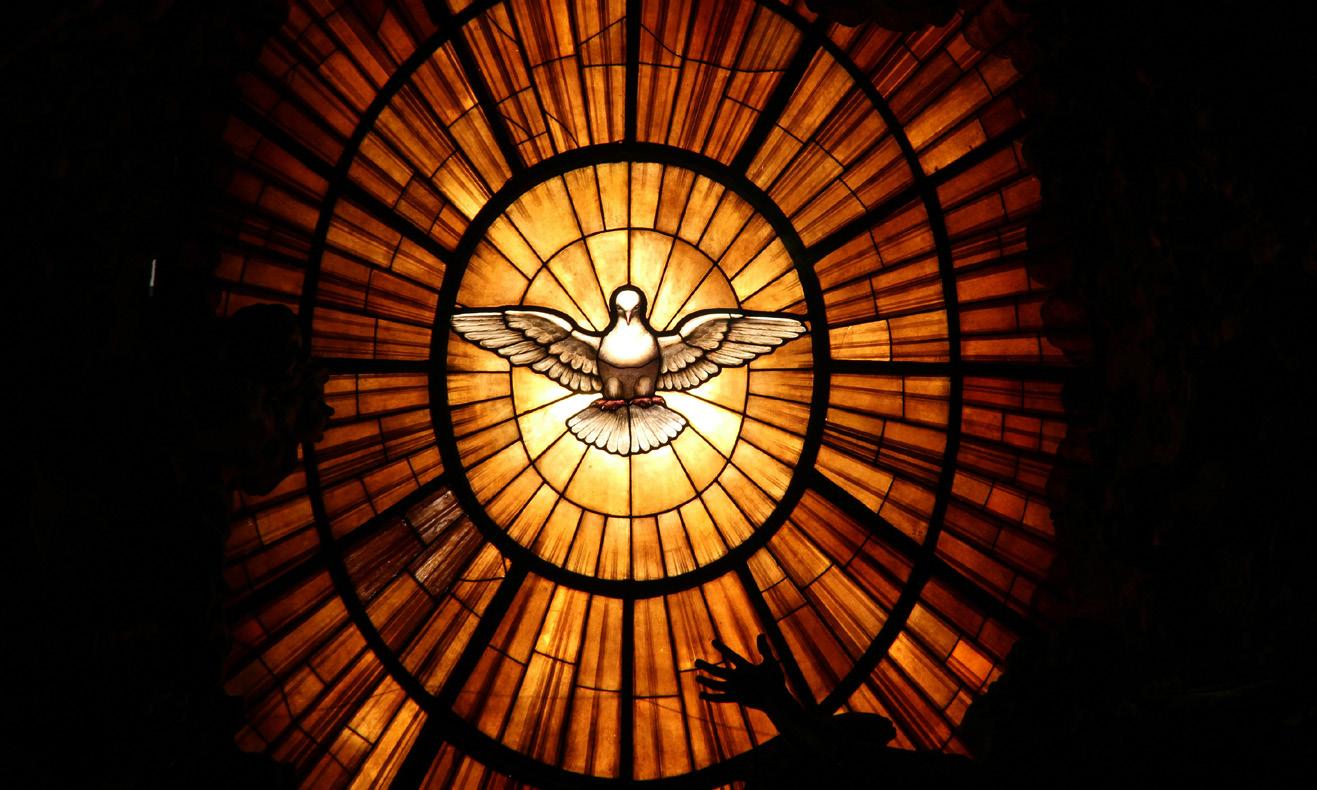
remember, as a 20-something new believer in Christ, eagerly trying to grasp just what God was doing in me. The joy of knowing I was truly forgiven was thrilling! Everything was new. I had never attended church growing up, and I was excited, albeit a little overwhelmed, trying to get up to speed with all the lingo and etiquette of church culture. Thankfully, my new brothers and sisters were very gracious and kind, though I’m sure they must have had some good laughs about me.
Soon enough, I began to feel at home in the congregation and was hungry to learn and understand theologically what I was experiencing personally. Participation by everyone in the ministry of the congregation was encouraged. To that end, there was a great deal of teaching about spiritual gifts and the fruit of the Spirit. Much of it went over my head, but one phrase stuck in my mind: “Gifts are given; fruit is grown.” That made sense, and I often quoted it. But is this statement strictly accurate? I have since come to realize that the relationship between spiritual gifts and the fruit of the Spirit is more nuanced and intertwined than this statement may imply.
According to Scripture, spiritual gifts are various abilities given to individual believers by the Holy Spirit (I Corinthians 12:4, Romans 12:6) that they may be equipped for the work of building up the body of Christ (Ephesians 4:12). Our own AFLC Fundamental Principle No. 6 acknowledges that the Lord gives these gifts for the edification of the congregation. These gifts include prophecy, teaching, service, administration, giving, etc. In other words, spiritual gifts enable believers to do the work of building up the congregation that all might mature to the fullness of Christ (Ephesians 4:13).
The ability to do _______ (insert gift) within the congregation is given by God. Yet, if these various gifts are never recognized or exercised, it’s as if they were never given, and the congregation’s opportunities for spiritual
growth are diminished. In contrast, when gifts are exercised in the congregation, growth follows. Additionally, the gift grows in its effectiveness the more it is used. For example, if you’ve ever led studies or preached for a season, you probably wouldn’t consider your first attempt the best. Like any ability, the more we practice and learn through that practice, the greater our ability will become. Yes, gifts are given, but they are only given to be used. And through that use they can also be grown.
If you are reading this and are a believer, God has given you a spiritual gift to bless others in your congregation; don’t let it lie dormant!
If spiritual gifts are about what we do in Christ, the fruit of the Spirit is about who we are in Christ. Or, perhaps more exactly, who we are becoming through the ongoing work of the Holy Spirit—people who are more Christlike. While gifts are varied and variously distributed, spiritual fruit— love, joy, peace, patience, kindness, goodness, faithfulness, gentleness, self-control (Galatians 5:22–23)—is grown in all believers as we mature in our walk with God. Yes, fruit is grown, but the grower and giver of every good thing is God.
Martyn Lloyd-Jones, the former pastor of Westminster Chapel, once said, “To love to preach is one thing; to love those to whom we preach is quite another.” This profound thought sums up well the complementary relationship between spiritual gifts and fruit. That someone is able to teach is a needed gift in a congregation. But to be a patient teacher is to make the gift greater. To be able to proclaim the truth is needed. But to proclaim it in love and gentleness is needed more.
Indeed, the exercise of spiritual gifts without spiritual fruit can be unhelpful and even harmful to the body of Christ. Paul speaks directly to this point in his first letter to the Corinthians. The twelfth chapter, an exposition
and defense of the distribution of spiritual gifts within the church, closes with Paul’s encouragement to “earnestly desire the greater gifts. And I show you a still more excellent way.” He then launches into the great chapter on love—the central fruit of the Spirit. He proclaims that eloquence without love is mere noise; the use of prophecy, knowledge—and even faith—that lacks love is nothing; charity and even martyrdom without love yield no profit. In summary, when gifts in the congregation are exercised with the fruit of the Spirit, growth follows. Spiritual gifts enable believers to do what is needed for that growth. The fruit of the Spirit is what believers are becoming in Christ. Gifts are given and can grow when used. Fruit is grown and given, as every good thing is, by God.
Graves serves Ebenezer Free Lutheran, Humboldt, Tenn.
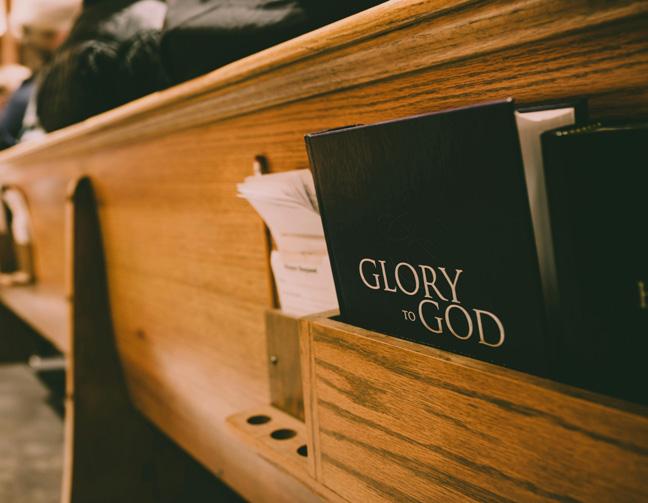

spent nearly all my adult life learning, teaching, and administering the Means of Grace. Years of ministry and study gave me a deep and rich appreciation of the sacraments. I didn’t expect that, in retirement, I would gain a new and refreshing perspective on the Word of God, baptism, and communion.
In my role as pastor, my relationship to the Means of Grace was active. I was the one in charge. I was the one responsible for the right teaching of the Word of God and for correctly administering the sacraments. Now, as a member of the congregation, I experience and receive the Means of Grace from a perspective that allows me to be fully present to their power.
Preaching isn’t the only way we receive the Word of God, but in the life of the congregation, preaching is central. Preparing for a sermon was an enriching experience. Studying and reflecting on a passage of Scripture is lifegiving, even when working toward a sermon. I enjoyed the act of preaching, but it was work. What I learned in retirement was that listening—really listening—to a sermon is work too, but with a blessing attached.
While serving as a pastor, I listened to other preachers, but in the back of my mind I always knew that in a week or two it would be my turn to be up there. I couldn’t help but think about how I would handle that text. Freed from the pressure of creating my own sermons, I started paying closer attention to what I was hearing. I began to see and appreciate the flow and direction of the preacher.
I also discovered that listening to a sermon takes effort. I am easily distracted. Often something I heard in a sermon would trigger a thought of my own, and I would be down a rabbit hole of imagination for several minutes. When I
returned to the present, I had lost the preacher’s train of thought. I am learning to check my thoughts and follow the flow of the message. The preacher is the one appointed to bring the Word of God. My own thoughts can wait.
As a pastor, I worked at being a good law and gospel teacher. In retirement, I discovered you can also be a law and gospel listener. When I hear something that moves my spirit, I ask, Why did the Holy Spirit draw my attention here? Is what I am hearing the law, requiring something of me, or is it the gospel, offering me something in Christ? What is it saying to my soul? Being a law and gospel listener is work, too.
BAPTISM
I had the privilege of baptizing many people in my 37 years as pastor of Faith Church. Baptisms were always special, but they came with a lot of preparation. There were many details to pay attention to: Now where did I put that cordless mic? Officiating a baptism always brought joy, but it was still only one of the many responsibilities of the service.
One of the first baptisms I witnessed in retirement was that of two of my grandchildren. I was the typical grandparent, sitting in the front row, camera at the ready. I watched my children smiling and a little nervous. I heard the ancient words. I made the vow. I saw the water, heard the Word, and let my feelings, thoughts, and prayers flow. I savored the moment and found a deeper appreciation of the gift of baptism.
I loved leading the Lord’s Supper. Remembering the familiar, comforting words of Christ’s sacrifice, looking people in the eye as they took the bread and the cup, and pronouncing the forgiveness of sins in Jesus’ name was a privilege.
My experience of communion from the pew is more relaxed. I can focus on the words and reflect on the promise given in the message. Our pastor often helps us with a sentence or two on how communion reinforces what we just heard. I see the people walk forward. I notice them acknowledging each other as they receive the gift of life, and I savor the truth that I am part of this community. I can concentrate on the promise of forgiveness and express my desire to follow Jesus as I join the congregation in this sacred act of the Lord’s Supper. I feel there is something humbling about receiving the Lord’s Supper when someone else has prepared it—and that is good for my soul.
I count myself fortunate to have experienced the Means of Grace from the perspective of both pastor and member of a congregation. The blessing of the Means of Grace has riches I am still discovering. “Oh, the depth of the riches of the wisdom and knowledge of God” (Romans 11:33).
Snipstead is a member of Faith Lutheran, Kalispell, Mont.
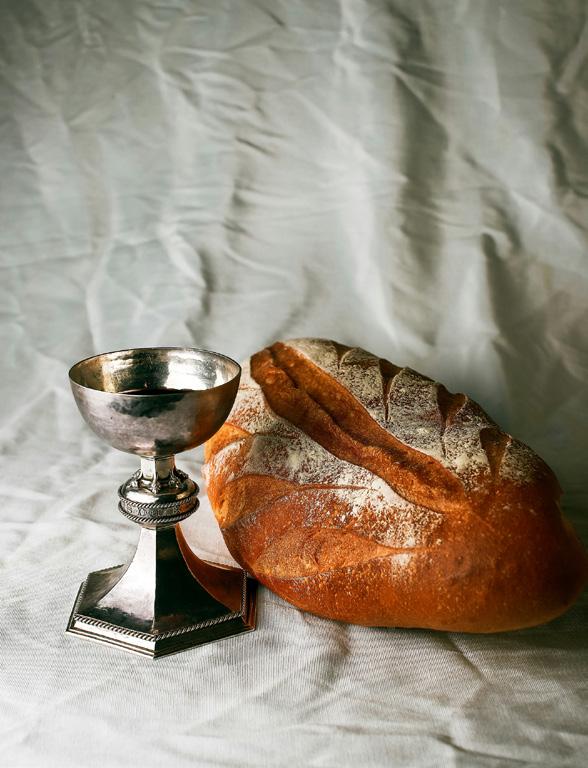

arly on in our marriage, my husband and I were at a crossroads deciding what our first summer break as a married seminary couple would look like. Should we go to India, as planned, on a vision trip? Or should we go to his hometown in North Dakota to pursue a ministry to the man camps of the booming oil work, as suggested by the pastor of his home church? Both were good options. Both came with a long list of pros and cons. It seemed like an impossible decision to make on our own, not because we were disunified, but because neither of us felt a strong sense of the Lord’s leading.
We met with a close pastor friend of ours and shared our heart about this decision. He gave us advice that has stuck with us for the rest of our ministry, advice we’ve gone back to when we’ve had other decisions to make along the way: “Maybe God is letting you decide what you want to do. Sometimes God, in his great love for us, allows us to decide.”
In the end, we went to India. Then, a year later, we went again. And nearly four years after that conversation, we moved our little family of three across several continents to settle into that small Indian village.
Sometimes the decisions we make feel weighty, like whatever we choose will impact the rest of our lives. We take these decisions very seriously, carefully and prayerfully rolling them over and over in our minds. You may also feel the weight of life’s circumstances and the decisions that need to be made in the wake of them. Take them to the Lord, yes. But I also hope you have a shepherding pastor you trust and respect, one whom you can go to with questions. Someone who can point you to Scripture, pray with you, take the time to listen to your heart, and guide you through life’s challenges.
We lived in India for about eight months before we had to leave, quite abruptly, due to visa regulations. It was a very


difficult time for our family. In the year and a half prior to leaving India, we experienced two miscarriages and a close family member’s terminal brain cancer diagnosis. We came back to the U.S. hurting. We felt the Lord leading our family to join a church that we had never attended before. We had a conversation with the pastor who was there at the time, sharing our hearts and our hurts. He was quick to grieve with us and slow to speak. His response to us was, “Just come. Let us pour into you.” We were at a place where we had nothing left to give, and we were welcomed with open hearts and arms to a community that expected nothing from us. They just loved us well.
Each one of us can recount times in our lives when we’ve felt the burdens of this world. Maybe you have sought counseling or medical care; those can be wonderful things for many people. But I also hope you’ve sought pastoral care. Most pastors are not licensed and trained therapists, but they can offer something that many licensed therapists cannot: spiritual care—the work of the heart in conjunction with the mind. Pastors point us to the promises of the Lord in kindness and in truth. That is what it means to be a shepherding pastor.
As I Peter 5:2 exhorts, “Be shepherds of God’s flock … because you are willing.” There is no obligation for anyone to pursue a life of full-time ministry. On the contrary, it is a privilege and an honor to serve the Lord and his people in this way, not out of obligation, but in eagerness.
Pastors, be encouraged! You are making a difference. Your flock needs you, even if it seems at times that they don’t. Your presence in the church and community is felt. And to those pastors who are weary, don’t hesitate to find your own shepherding pastor with whom you can bear your burdens. We are all called to be that for one another, pastors (and missionaries) alike. “Bear one another’s burdens, and so fulfill the law of Christ” (Galatians 6:2, ESV).
Our family has experienced the gift of being shepherded. May you all have this in your life as well.
Raan is a member of Zion Lutheran, Tioga, N.D.
rom my church office I hear the copy machine across the hall and the sound of paper being folded and stuffed into envelopes. Its Monday afternoon, which means a deaconess is preparing to hand-deliver our weekly newsletter to our congregation’s shut-ins. I know which deaconess it is, too: a stealthy 1-yearold named Isaac has made multiple attempts to get at my Hebrew letter building blocks in my office, which means it must be Alley Erickson’s turn to deliver the newsletters.
Alley is the wife of our seminary intern Adam Erickson, who joined our congregation back in June. After prayerful consideration, Alley agreed to fill a temporarily vacated role as a church officer in our congregation. She was asked to be a deaconess.
What is a deaconess, you ask? We know of at least one in Scripture, a sister in Christ named Phoebe, who served the church in Cenchreae. Paul titles her a deakonon of that early church in Romans 16:1. This is the Greek word for deacon, or when applied to a woman, a deaconess. Through the centuries, the Christian church (especially the Lutheran and Methodist churches) has formally recognized this calling for women in the congregation.
Not every congregation has a deaconess ministry. Since our congregation’s founding in 1966, we have. Our constitution explains the ministry of deacons and deaconesses together: the deacons see to the pastoral care of the congregation, while the deaconesses “shall visit the poor and suffering, the widowed and orphans, and bring them consolation and help, as God gives them grace” (excerpt from our constitution). Our congregation recognizes the distinct roles of men and women when appointing spiritual leaders, each utilizing their gifts according to the various duties of faithful ministers in the church. Bethel pastors routinely meet with deaconesses to go over our membership and visitor lists to see who might be slipping through the cracks, seeing that no one is forgotten.
The visitation of the poor and suffering was a calling placed upon Alley Erickson’s heart preceding her moving to Grafton for Adam’s internship. In pursuing her undergraduate degree, Alley felt led to complete an internship of her own in hospice care.
“I loved getting to know them through listening to their stories, fears, and hopes, and reassuring them that they’re
safe and loved,” Alley shared. “It became clear very quickly that this was necessary and meaningful work that I wanted to be a part of.”
Alley completed her master’s and became a hospice social worker, working with families throughout Adam’s time in seminary. Adam and Alley made the decision for her to stay home with their son Isaac for their seminary internship year. Yet Alley still discerned a call to continue her ministry to the suffering. As so often happens, the Lord had an opportunity awaiting her to utilize her training and her gifts.
Alley hoped to shadow a deaconess at our church to bring what she had learned in social work to the context of the ministry of the congregation. But where many of us might desire to wade into a new ministry pool slowly to acclimate, Alley was asked to dive in the deep end. A deaconess serving at Bethel had recently moved away, leaving a vacated position to be filled by appointment by the church council. Alley was asked; she prayed; she accepted.

Alley says hospice work built within her a level of comfort in talking about difficult things with families. As a social worker, Alley responded to the hard questions families faced with words of comfort and warmth; as a deaconess, she does the same, but now with full freedom to declare the words of the gospel.
Deaconesses have the privilege of sharing the love of Christ, both in physical service and the declaration of the gospel. The good news of Jesus Christ is shared alongside the holding of a hand, a ride to the hospital or to confirmation class, or the delivery of a meal. These ministries and more needed someone with Alley’s gifts for such a time as this, and Alley needed this call as she

lives out her vocation within the greater body of Christ. As Paul declares in Romans 14:19, a central teaching on the ministry of the congregation: “So then let us pursue what makes for peace and for mutual upbuilding.” Bethel and the Ericksons have mutually built up one another.
Might your church be blessed through a deaconess ministry? Perhaps your church is strategic in its care for the widows, the suffering, and the orphans outside of a deaconess ministry. Praise God. If you’re not sure, I would encourage you to speak to leadership within your congregation to see what active steps your church takes in this ministry. If these responsibilities are solely that of your pastor, this may be a wonderful opportunity to share the load of needed care to those most vulnerable in your church family.
To those who serve as deaconesses and those who serve without title, thank you for your work behind the scenes in being the hands and feet of Christ. May each of us be faithful in the care of our neighbor, according to the love of Christ already given to us. Amen.
Westerbur serves Bethel Lutheran, Grafton, N.D.

ithout sacrifice, there is no love.” Those are the words of Father Maximilian Kolbe, a Polish Catholic priest who voluntarily took the place of another Auschwitz prisoner in a starvation cell during World War II. I remember standing outside the bunker room where he died and seeing the candle Pope John Paul II placed in the cell to honor a sacrifice that mirrored Christ’s. A light to honor God’s light in Father Kolbe, which, at the greatest cost to himself, he did not hide. •
In Matthew 5:13–14, Jesus makes it clear that being his witnesses is not an option but a calling. He doesn’t even say that we need to become salt and light, but that we are—a more exacting assertion, because it means that if we are flavorless and hidden, no one can cover for us. Only the church are the hands and feet of God.
Though some Christians are taught that faith brings earthly prosperity, most of us can’t afford to believe it. We know that, oddly, a lot of people hate salt and love darkness. So we expect pushback, and even persecution. It’s not a coincidence when King David prophesies of himself, Christ, and the church, “They have pierced my hands and feet” (Psalm 22:16). But whereas we may be willing to suffer for the truth, we are less willing to suffer for other people.
Yet Jesus’ public witness entailed suffering for both. Much of his Sermon on the Mount challenges our instincts about what counts as “good enough.” It’s not good enough to avoid killing someone or sleeping with someone you’re not married to. If you insult your brother or if you lust after another person, you’ve committed murder and adultery. When we look at ourselves and say, “I haven’t killed, I haven’t slept around,” or even “I’ve suffered for the truth,” we should hear Jesus’ words to the rich young ruler: “You lack one thing …” (Mark 10:21).
What does it mean to suffer, to deeply sacrifice for other people? God tells us through Isaiah (58:6–8a, 10):
“Is not this the fast that I choose: to loose the bonds of wickedness, to undo the straps of the yoke, to let the oppressed go free, and to break every yoke?
Is it not to share your bread with the hungry and bring the homeless poor into your house; when you see the naked, to cover him, and not to hide yourself from your own flesh?
Then shall your light break forth like the dawn … if you pour yourself out for the hungry and satisfy the desire of the afflicted, then shall your light rise in the darkness and your gloom be as the noonday.”
Giving up our lives in service to other people, speaking the gospel to those under the yoke of sin, offering our attention to those we would rather not see, treating our money as a gift and not a possession, advocating for the oppressed in our midst, seeking to meet the needs of other people with the resources God has given us—in all these ways, we burn with the light of Christ, and it rises in the darkness.
And in writing that list, I’m grieved. It’s a “sacrifice” for me to ask my neighbor if she wants to walk with me instead of plugging in my earbuds. It only just occurred to me that we could set aside money for the organizations working to help the several hundred houseless people in Santa Fe. My almost-three-year-old sister-in-law is black, and I still have only a vague notion of the corporate pain people who share her skin color have experienced in the United States. I am so slow to sacrifice. Slow to care.
When we come to Jesus’ words about salt and light, we cannot dilute or dim them. God asks for nothing less than our full commitment to the truth and the total surrender of our lives to serve the people around us. That is what Jesus gave; that’s what we must give. But the great power of the Church is that we have no power except God’s. If he asks us to do something, we in turn ask him to help us do it. If I am ashamed of my weak attempts to willingly suffer for others, God is infinitely more able to receive my confession and my request for strength and infinitely more able than I expect to make a witness of my life. “A dimly burning wick he will not quench” (Isaiah 42:3).
A sacrifice like Father Kolbe’s overwhelms me with its love. But I believe a death like his is the fruit of a humble life of confessing sin and need, of asking God not to quench the flame for its dimness, of learning each day to see people how God sees them and to cast salt and light. May we pray to be faithfully what God tells us that we are.
Skogerboe, Santa Fe, N.M., is the digital communications coordinator for the AFLC.
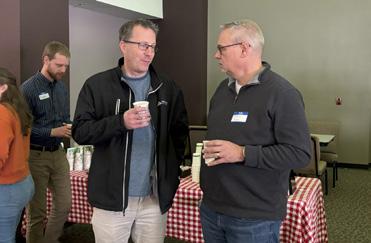
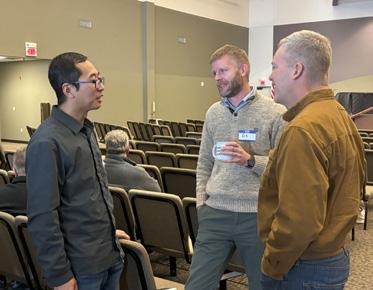
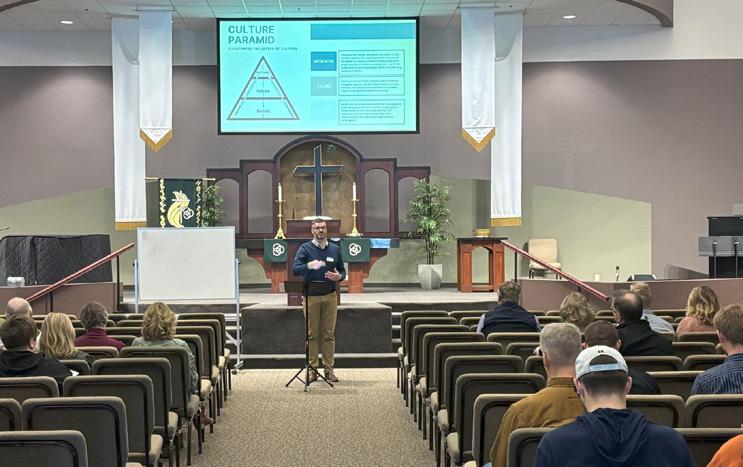
BY PASTOR ANDY COYLE
Morning
8:40 a.m. Prayer
9 a.m.: Session 1: Theology of Mission
9:45 a.m. Discussion
10 a.m. Break
10:10 a.m. Session 2: Holistic Mission and Congregational Systems
10:45 a.m. Discussion
11:00 a.m. Break
11:10 a.m. Session 3: Leading Change
11:40 a.m. Discussion
11:50 a.m. Lunch
Afternoon
12:20 p.m. Prayer
12:30 p.m. Workshop 1 Options
• Missional Worship Service
• Missional Discipleship
1:20 p.m. Workshop 2 Options
• Missional Hospitality
• Missional Assimilation
2:10 p.m. Workshop 3 Options
• Missional Communications
• Missional Outreach
2:50 p.m. Closing
Coyle is the director of AFLC Home Missions.
very congregation is an active participant in the mission of our Triune God. A local church is more than a building or a weekly gathering. It is a sacred space where God nourishes and feeds his people, and it is also a sent community—a people called to join God in his redemptive mission in the world. God graciously gives his people the privilege of being both recipients and partners in this mission.
This is a grand and beautiful story. Yet, in the busyness of ministry, the clarity and joy of that calling can begin to fade. Pastors, leaders, and congregations can become so overwhelmed by daily responsibilities that the theology of mission becomes disconnected from the practice of mission. When this happens, ministry can lose its vitality, and renewal in our hearts and congregations can be hindered. Many have experienced this—even those who lead. But there is hope. Our Lord is a God of mercy and renewal.
Congregational renewal is the Spirit-led process by which individuals and churches reawaken to their gospel identity. Renewal means realigning a congregation’s culture, systems, and practices around the transforming presence of Christ, resulting in deeper faithfulness and greater outward impact.
To encourage and equip churches for this important work, AFLC Home Missions is hosting a regional conference on Saturday, Nov. 8. The event will be held from 8:40 a.m. to 3 p.m. at Emmaus Free Lutheran Church in Bloomington, Minn. The theme is “Mission Clarity: Renewing Congregations for the Mission of God.”
Morning plenary sessions will explore the foundations of mission, including Theology of Mission, Holistic Mission and Congregational Systems, and Leading Change. After a box lunch, participants will choose from six practical workshops focused on key congregational systems: worship service, discipleship, hospitality, assimilation, communications, and outreach. Each participant will be able to attend three workshops, each filled with tools and strategies to help recalibrate these systems for greater missional impact.
The conference is free, and childcare and lunch will be provided, but registration is encouraged so that we can plan for those needs. Participants may register and access promotional materials by visiting the events tab at aflchomemissions.org.
This regional conference is a valuable opportunity for pastors and church leaders to pause, refocus, and be renewed in their calling. The hope is that it will be an encouraging and productive time, equipping your congregation to participate more fully in the mission God has given his Church.
• CELEBRATING 35 YEARS OF SERVING CHILDREN IN NEED
BY JONNI SLIVER
his is a special year for the Miriam Home. Pastor Connely and Carolyn Dyrud, former AFLC missionaries, began the Miriam Home in 1990, so we are celebrating 35 years of providing open arms to receive children in need. Though I don’t know the exact number, more than 3,000 children have passed through this home—some for years, others for days. We believe that every one of them came to the Miriam Home for a reason, and that the work the Lord begins here continues after the children leave.
One of the things we have learned is that every child who comes to us is precious and unique. Though they may come with siblings, they are not all the same. Though their mothers may have lived in the Miriam Home in the past, they are not their mothers, and they don’t have to continue down the road their mothers chose. One of our great joys is seeing older children learn who they are and who they can be in Jesus. Another is seeing our littlest ones learn the first, truest things—to be kind, to be generous, to have compassion. After 35 years there are more examples than I can share, but let me show you two.

Theo is only 2 years old. He is the son of a girl who had been in the Miriam Home but chose (at least for today) to continue going her own way, knowing she would lose her child. Theo has been with us for nine months, and we have loved seeing this little boy grow in joy and grace. With a lot of friends his age, Theo hasn’t shown jealousy or competition, but true joy and care for his little friends.
We are praying the God will guard these qualities and cause them to grow. We are also praying for just the right family for Theo who will help him to grow to be the man God means him to be.

Maria Vitoria came to the Miriam Home for the first time when she was 14. She came with a younger brother and little sister because their mom was working to become sober. Though Mom made it through recuperation and the family was reunited, the sobriety didn’t last long, and within a year the children were back with us. The second time went much better; by the time Maria was 17, the family was reunited, and Mom was working hard and not drinking.
During her first visit, Maria accepted Jesus. Through all of her mother’s highs and lows, Maria held on to the Lord. She also made sure that her little sister came to church, Sunday school, and Kid’s Club, even though her mother had no interest. At 18, Maria began attending the Free Lutheran Bible School, and during the two years she was on campus, she helped in the Miriam Home and the Lee family, caring for the children to help Hannah.
The following two years Maria worked as a house mom in the Miriam Home, caring for the children on the weekends. We were able to see Maria grow step by step. She had a lot of wounds from her past, but she also wanted to grow. Above all, she wanted to be the woman God made her to be and not conform to the pattern she had seen at home.
There are so many dreams God has for the children we receive. It is the privilege of every member of the Miriam Home family to have a part in seeing those dreams come true.
“I know the plans that I have for you, plans for good and not for evil, for a future and a hope” (Jeremiah 29: 11).
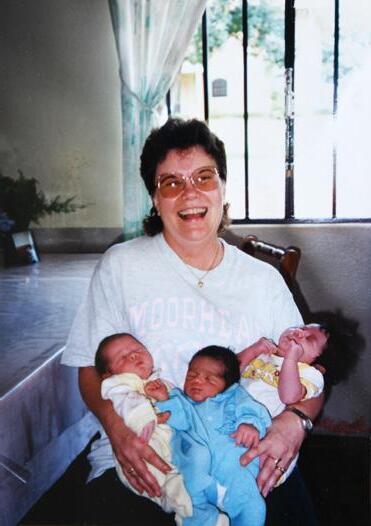
• Founded: In 1990 by Pastor Connely and Carolyn Dyrud (pictured above), AFLC missionaries to Brazil.
• Location: Campo Mourão, Brazil
• Serving: Children in need. To date more than 3,000 children have lived at the Miriam Home.
• More information: aflcworldmissions.org
Sliver, an AFLC missionary, serves the Miriam Home, a ministry of AFLC–Brazil at Campo Mourão, Brazil.
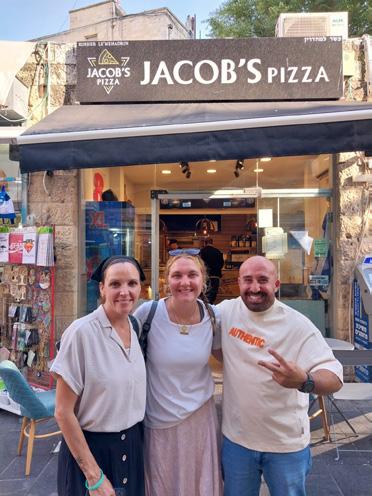

Find us on our website
• aflcworldmissions.org/journeymissions
Send us an email
• jon.nelson@aflc.org
Nelson, a member of Hope Lutheran, Minneapolis, is the department head of Journey Missions
BY JON NELSON
ollowing this year’s Annual Conference and FLY Convention, it struck me that, though Journey Missions has been a ministry of the AFLC for more than 10 years, there’s still plenty of questions about our purpose. Here’s how Journey Missions programs serve our local congregations.
As a ministry of AFLC World Missions, we provide short-term, immersive mission trips that allow participants of all ages to step out of their comfort zones and engage in evangelism, discipleship, and community development. We help expand God’s kingdom by partnering with AFLC missionaries and national church leaders. Trips (one–three weeks) and the Missionary Assistant Program (more than two months) typically take participants to countries in Africa, Asia, South America, and Europe. The goal is to meet the spiritual and physical needs of the communities they serve.
There are four principles that a typical trip includes. First, before embarking on a ministry trip, participants undergo spiritual and practical preparation. This often includes learning about the culture, language, and religious context of the destination, as well as mission principles and strategies. It’s also a time for personal reflection, team building, and prayer.
Our second principle is hands-on ministry. Each trip is designed for participants to experience the challenges and rewards of global mission work through many ministry aspects. Through evangelism and discipleship, participants share the gospel with locals, helping them grow in their faith through Bible studies, teaching, and personal relationships. Through community outreach, we provide practical support like construction work and helping with local schools and/or children’s homes. Through church support, we assist local congregations by helping pastors and leaders in building and outreach efforts.
Our third principle is cultural immersion. Participants learn about a new culture to better understand the challenges, joys, and realities people in these countries face. This could include learning the language, trying new foods, and participating in local customs and worship practices.
Last, the program encourages personal spiritual growth, expanding participants’ understanding of the global church and fostering a heart for missions. These trips often become a pivotal moment in the spiritual lives of our participants. Whether they’re coming back with a stronger sense of purpose, a passion for missions, or a call to long-term service, the trips make a profound impact. Additionally, the communities and local churches we serve benefit significantly. The practical help provided often supports long-term development, and the spiritual outreach helps plant seeds for lasting change. We’ve found that local leaders benefit from the partnership and resources that teams bring.
Our hope is to offer transformative opportunities for both those going on ministry trips and those being served. By participating, individuals grow in their faith, build lasting relationships, and witness firsthand the power of God’s kingdom expanding around the world.
If you or your congregation are interested in participating or learning more, we’d love to hear from you! For those who can’t participate on the field, Journey Missions encourages partnership through prayer, donations, and by sharing the mission’s needs with others.

BY KAREN PEDERSON
uring WMF Day at the Annual Conference in June, two new officers were elected to serve on our national WMF Board. Jenna Lee is our new first vice president. She hails from Ray, N.D., and is a member at Emmanuel Lutheran in Williston, N.D. She is a farmer’s wife and mother to three girls who love sports, so she’s on the road often. As part of her duties, Jenna will be in contact with our district officers and work with our nominating committee.
Joanne Herset, our new recording secretary, is a member of Faith Lutheran in Kalispell, Mont., where she makes her home. Joanne is retired, quilts, watches her grandsons, and organizes a group called Single Ladies of a Certain Age. Joanne’s main duties are to keep meeting minutes and to act as the custodian of the archives of the national WMF.
Our national WMF Board also includes Karen Pederson (president), Liz McCarlson (second vice president), Margie Lee (treasurer), and Linda Fugleberg (communications secretary). Full biographies of our new officers can be found in our July/August newsletter (WMF eNews) along with stories from Home Missions and a summary of our WMF Day sessions and photos.
Members of the WMF Board will gather in person during the All Boards conference (Oct. 6–7) at our AFLC campus in Plymouth, Minn., to pray for God’s vision and desire for our WMF for 2026. We will meet with the directors of World Missions, the Free Lutheran Bible College and Seminary, Parish Education, and Home Missions, as well as AFLC President Micah Hjermstad, to hear their plans and needs. The board will select the WMF projects to support for 2026 giving. A more detailed overview of these projects will be available at the end of the year on our website; please share these projects with your local WMF and store the information in your resource packet. We will also share about the WMF with students at FLBC and hand out treats.
Work continues on the 2026 WMF Bible study, I Believe, by Joyce Erickson. The study will be available in late fall. Members of the WMF Board work diligently to discuss writers for future Bible studies, rotating topical Bible studies with studies of a book of the Bible. For each study, both grammatical and doctrinal editors are selected, as well as a pastor and wife to edit and provide clarity where needed. Jenn Thorson works with the production of the WMF study to get it formatted, printed, and shipped to you.
Our WMF Facebook and Instagram pages have a daily Bible verse to meditate on; please follow us there. We would like to post about your district WMF rallies so we can keep in touch with each other until we meet again.
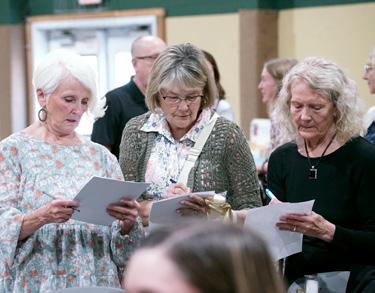
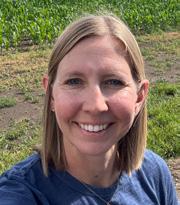
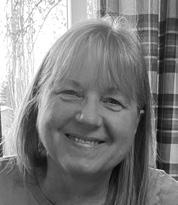

Our bi-monthly WMF eNews includes updates on our projects and stories of those who are on the receiving end of our giving. To sign up with your email, scan the QR code above. Or, email Jenn Thorson. A link can also be found on our website.
• Email: wmfcomm@aflc.org
• Website: aflc.org/women/wmf-day
Pederson, a member of Zion Lutheran, Tioga, N.D., is the president of the Women’s Missionary Federation.
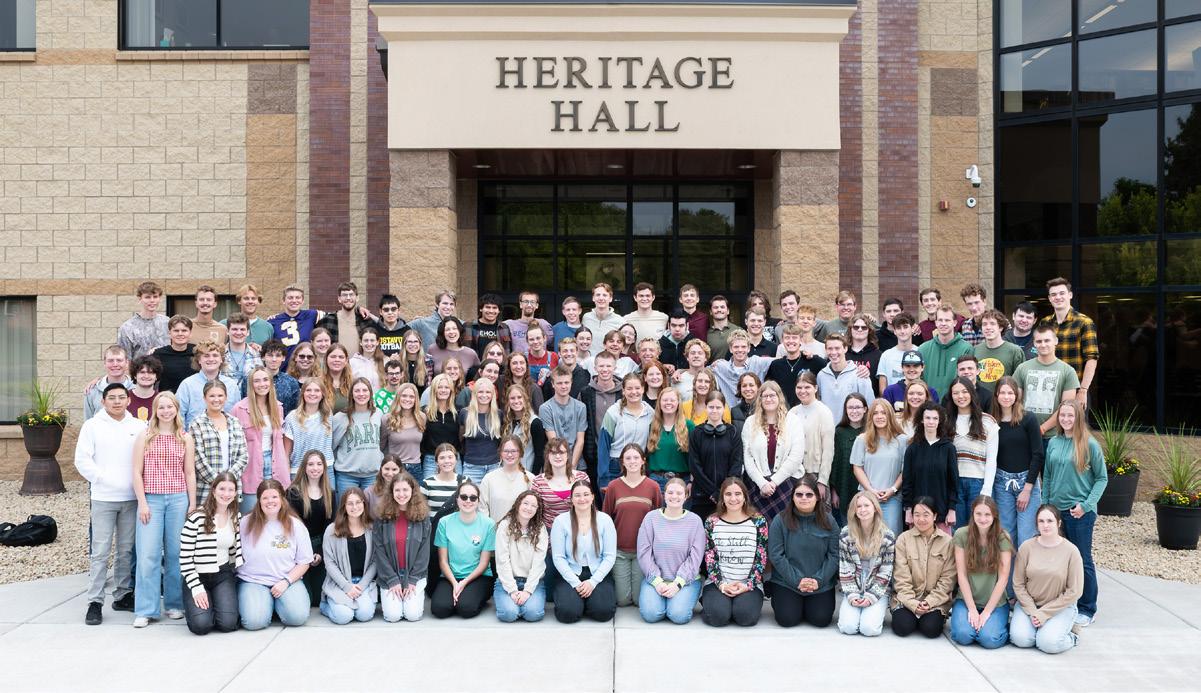
and 5 upperclassmen, for the 2025–26
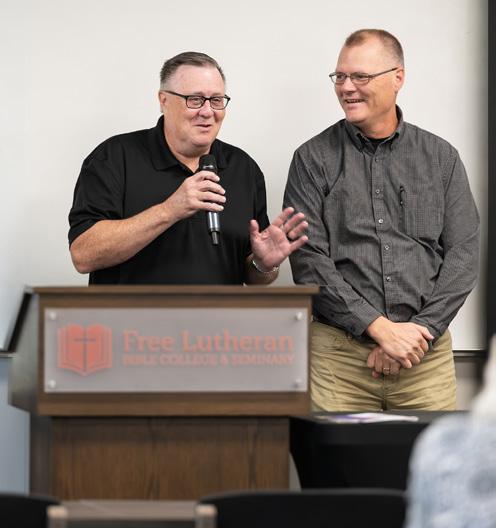
Conference: aflc.org/pastorsconference
The AFLC All Boards conference will be held Oct. 6–7, followed by the AFLC Pastors’ Conference on Oct. 7–9.
Members of all of the AFLC boards and committees will meet on the campus of the AFLC Schools and administration building in Plymouth, Minn. Beginning on Oct. 6, the boards and committees will meet for regular business meetings. On Tuesday, Oct. 7, a large group meeting will be held in the classroom of the Student Life Center.
The schedule includes the installation of new board and committee members at 8:30 a.m., followed by a roundtable discussion on the state of the AFLC, led by Pastor Micah Hjermstad, president of the AFLC.
Following a break, the conference will conclude with a member of each board or committee sharing a brief update on their respective ministry.
The Pastor’s Conference will be held at the Association Retreat Center, located near Osceola, Wis. The theme of this year’s conference is “The Diligent Leader” from Romans 12:6, 8.
Pastor Andrew Kneeland will speak at the opening service at 7 p.m. on Oct. 7. Sessions on Oct. 8 include “Leading With the Word” (Pastor Micah Hjermstad), “The Pastor as Worship Leader” (Pastor Andy Coyle), “Leading Through Turbulance” (panel), and “Navigating Leadership Trauma” (Dr. Jason Holt). The day will close with a banquet at 5:30 p.m. with Rory Martin from Church Ambassador Network. Thursday morning’s schedule includes two sessions: “Pastoral Compensation Survey” and a group discussion on “Ministry Opportunities in Retirement.” The conference will close following lunch.
The Lutheran Ambassador
Publication No. 588-620, Filed 09-17-25
Issued monthly. Twelve issues annually.
Annual subscription price $0
Mailing address of Office of Publication and headquarters of General Business Office: 3110 E. Medicine Lake Blvd., Minneapolis, MN 55441.
Publisher: The Association of Free Lutheran Congregations.
Editor: Pastor Andrew Kneeland, 3110 E. Medicine Lake Blvd., Plymouth, MN 55441
Managing Editor: Ruth Gunderson, 3110 E. Medicine Lake Blvd., Minneapolis, MN 55441
Owner: The Association of Free Lutheran Congregations, 3110 E. Medicine Lake Blvd., Minneapolis, MN 55441.
Known Bondholders, Mortgagees, and Other Security Holders: None.
The purpose, function, and nonprofit status of this organization and the exempt status for Federal income tax purposes has not changed during preceding 12 months.
Publication Name: The Lutheran Ambassador. Issue date for circulation data: September 2025
Total number of copies (net press run):
Avg. copies each issue during past year: 2937
Copies September 2025 issue: 2946
Paid circulation:
Mailed outside-county paid subscriptions stated on Form 3541:
Avg. copies each issue during past year: 0
Copies September 2025 issue: 0
Mailed inside-county paid subscriptions stated on Form 3541:
Avg. copies each issue during past year: 0
Copies September 2025 issue: 0
Through outside mail sales:
Avg. copies each issue during past year: 0
Copies September 2025 issue: 0
Total paid and/or requested circulation:
Avg. copies each issue during past year: 0
Copies September 2025 issue: 0
Free distribution by mail:
Free distribution outside the mail:
Avg. copies each issue during past year: 47
Copies September 2025 issue: 23
Total free distribution:
Avg. copies each issue during past year: 2665
Copies September 2025 issue: 2649
Total distribution:
Avg. copies each issue during past year: 2665
Copies September 2025 issue: 2649
Copies not distributed:
Avg. copies each issue during past year: 272
Copies September 2025 issue: 297
Total:
Avg. copies each issue during past year: 2937
Copies September 2025 issue: 2946
Percent paid and/or requested circulation, average and September 2025 issue: 0%
Publication is required and will be printed in the October 2025 issue of The Lutheran Ambassador. /s/ Ruth Gunderson, Managing Editor

The Free Lutheran Bible College and Seminary will host several upcoming events on their Plymouth, Minn., campus. For more info, visit flbc.edu/events.
FLAME, a Grammy-nominated Christian rapper and podcaster, will be the guest instructor at the fall Spotlight: Extra Nos event planned for Oct. 7 in Hauge Chapel. FLAME, who wrote Extra Nos: Discovering Grace Outside Myself and Because Jesus Taught It: Christianity Through the Eyes of the Church Fathers, founded Extra Nos Academy, which teaches on the core confessions of Christianity. FLAME will talk about his journey through a variety of Christian denominations to Lutheranism along with other topics.
Through three sessions, guests will learn how this rich reformation theology continues to inform the Church’s faith and life today. In the opening session (9 a.m.) FLAME will cover Reformation history from John Calvin to Martin Luther. The second session (10 a.m.) will cover what he calls the two kinds of righteousness, “2KRs,” in his eponymous song. In his final session, “Extra Nos Theology” (11 a.m.), he will talk about finding grace outside of himself.
Junior and senior high school students and recent graduates are invited to attend a free two-day preview event in which they will be welcome to sit in on classes, attend chapel and vesper services, play volleyball and basketball, and meet current students and professors. The event will take place Oct. 16–17.
The alumni tournaments will follow, beginning at 5 p.m. on Oct. 17 with the women’s basketball tournament, followed at 8 p.m. by the women’s volleyball tournament. The men’s basketball tournament will begin at 8 a.m. on Oct. 18, with lunch served at noon for registered attendees. A family room will be offered from 10 a.m. to 2 p.m. Individual registration fees are $25 (women) or $50 (men). The men’s tournament team fee is $350.
Register online at flbc.edu/2025-alumni-tournament.
The Coordinating Committee released
Pastor David Abel (Peoria, Ariz.) and Pastor David Jore (Mentor, Minn.) from the AFLC Fellowship Roster, which has a five-year limit on meeting program requirements.
The Coordinating Committee released Pastor Marc Rakow (Glencoe, Minn.) and Pastor Scott Guhl (Rantoul, Ill.) from the AFLC Clergy Roster. Both are serving nonAFLC congregations.
Pastor Alex Woodworth was installed
Sept. 7 at Ebenezer Lutheran Church, Northwood, N.D., with Pastor Dennis Norby, who serves Grace and Zion Free Lutheran congregations, Valley City, N.D., officiating.
Pastor James R. Johnson was installed
Sept. 7 at Redeemer Free Lutheran Church, Ontonagon, Mich., with Pastor Micah Hjermstad, AFLC president, officiating.
Correction: In the September issue, we failed to note that Pastor Troy Hanson was also installed Aug. 10 at Immanuel Free Lutheran, Centerville, S.D. He serves both congregations.
The Lutheran Ambassador seeks to keep our fellowship informed about important news amongst our congregations and ministries. If you have news to share, please email luthamb@aflc.org.
Parish Education
Helen Knutson
James Larson
Donald Strandlund
Marilyn Jacobson
FLBCS
Ruth Claus
Larry Moan
Mary Dotts
Marilyn Jacobson
Viviann Christenson
General Fund
Shirley Jackson
Home Missions
Robert Davidson
Donald Strandlund
Journey Missions
Mary Barden
Lutheran Ambassador
Gloria Lee
Priscilla Wold Dutcher
World Missions
Pastor Alvin & Frances Grothe
Youth Ministries
Larry Moan
... in honor of Evangelism
Aaron Arneson
FLBCS
Aaron Arneson
Lutheran Ambassador
Aaron Arneson
World Missions
Aaron Arneson
John & Anne Presteng
Pastor Jack (92) and Ruth (88) Aamot, Bloomington, Minn., died within one month of each other: April 8, 2025 (Ruth), and May 9, 2025 (Jack). Ruth, the daughter of Pastor John and Lillian Brekke, was born in Frontier, Saskatchewan, Canada. With her family, she lived in Seattle, Chicago, Fergus Falls, Minn., Minneapolis, and Fargo, N.D. Born June 23, 1932, in Northfield, Minn., Jack was the son of Cliff and Grace Aamot. He grew up in Jackson, Minn. He attended St. Olaf College, Northfield, before studying at Luther Seminary, St. Paul, Minn. He met Ruth, who was studying at the Swedish Hospital School of Nursing, Minneapolis. After their marriage, they served as missionaries in Brazil from 1958 to 1972, where they were part of a renewal movement called Encontrao (the large gathering). He served as a pastor in congregations in Van Nuys, Calif., South Minneapolis, and Bloomington (Emmaus Lutheran). They also returned to Brazil yearly for 22 years. Jack also served as the director of the Lutheran Evangelistic Movement.
Surviving are four children, Daniel, Jeff, Mark, and Kimberley; eight grandchildren; and three great-grandchildren. Ruth is survived by one brother, John. Jack is survived by three siblings, Judy, Mary, and Mark.
A memorial service was held Aug. 16 at Emmaus Lutheran, Bloomington, Minn., with Pastor Nick Dyrud and Pastor John Westby officiating.
Audrey Gilmore, 93, died July 26, 2025. Born March 1, 1932, she was the daughter of Amos and Irma (Johnson) Stolen. She married Richard Gilmore in 1956. He preceded her in death on Oct. 29, 2020. She graduated from St. Olaf College, Northfield, Minn., with a degree in speech education and coached debate and speech at Denfeld High School, Duluth, Minn. Following their marriage, they lived in Duluth and Cleveland, Ohio. In 1962, the Lord called them into full-time ministry. They served congregations in Winnipeg, Manitoba; Stoughton, Wis.; and La Crosse, Wis., before helping found Christ is Lord Lutheran in 1978 in Onalaska, Wis. In 1970, she helped organize a youth singing group called The New Minds as well as Youth Encounter. In 1978, she helped start the New Image Women’s Study. In 1998, she wrote A Church Where Christ is Lord Surviving are three children, Tracey (Greg) Finck, Princeton, Minn., David (Gretchen) Gilmore, Nerstrand, Minn., and Judy (Paul) Sather, Geneva, Ill.; nine grandchildren; and 12 great-grandchildren
A service was planned for Sept. 28 at Christ is Lord Church, Onalaska Wis.
BY DAVID HEIN
“Blessed are the merciful, for they shall receive mercy. Blessed are the pure in heart, for they shall see God. Blessed are the peacemakers, for they shall be called sons of God” (Matthew 5:7–9).

As we read the Beatitudes of Matthew 5:7–9, we might initially, or even solely, feel the weight of their call to be “merciful, pure, peacemakers.” Combine that with the future tense of the promises attached to each line, and we are tempted to think we must earn them through perfect mercy, purity, or peacemaking. This will only lead to pride or despair. Who can claim such virtues at all times? Only God can. The Beatitudes are indeed a guide for Christian living, but their fullest meaning shines when we see them through the person of Jesus Christ, who perfectly fulfills them and delivers their promises to us through himself.
Christ, the Merciful
Jesus is the embodiment of mercy. Scripture reveals his compassion in countless ways: he healed the sick (Mark 1:41), ate with sinners (Luke 15:2), and even forgave those who crucified him, praying, “Father, forgive them, for they know not what they do” (Luke 23:34). His mercy extends to all, offering forgiveness through his greatest act of mercy: the cross. The cross is the means by which Christ secured the Father’s mercy for all humanity (I John 2:2). As Hebrews 4:16 declares, we can now “draw near to the throne of grace, that we may receive mercy.” Jesus is both the Merciful One and the source of the mercy.
Christ, the Pure in Heart
The call to be pure in heart finds its perfection in Jesus, who, tempted in every respect, was “without sin” (Hebrews 4:15). Greater than any David, Christ was the man after God’s own heart. Jesus’ purity is not simply moral; it is his perfect communion with the Father. He declares, “Whoever has seen me has seen the Father” (John 14:9). Christ reveals the Father’s glory, even imaging the invisible God (Colossians 1:15). The promise of seeing God is fulfilled in Jesus, who reveals the very gospel that purifies our hearts while showing us God.
Christ, the Peacemaker
Jesus is the ultimate peacemaker, reconciling humanity to God. Colossians 1:20 proclaims that through him, God reconciled “all things to himself … making peace by the blood of his cross.” Romans 5:1 adds, “We have peace with God through our Lord Jesus Christ.” At Jesus’ baptism, the Father declared, “This is my beloved Son” (Matthew 3:17), affirming his identity as he began the ministry of reconciliation. Through his death and resurrection, we are adopted as God’s children (Galatians 4:4–5). Christ’s peacemaking erases the chasm between God and man, making us “sons of God.”
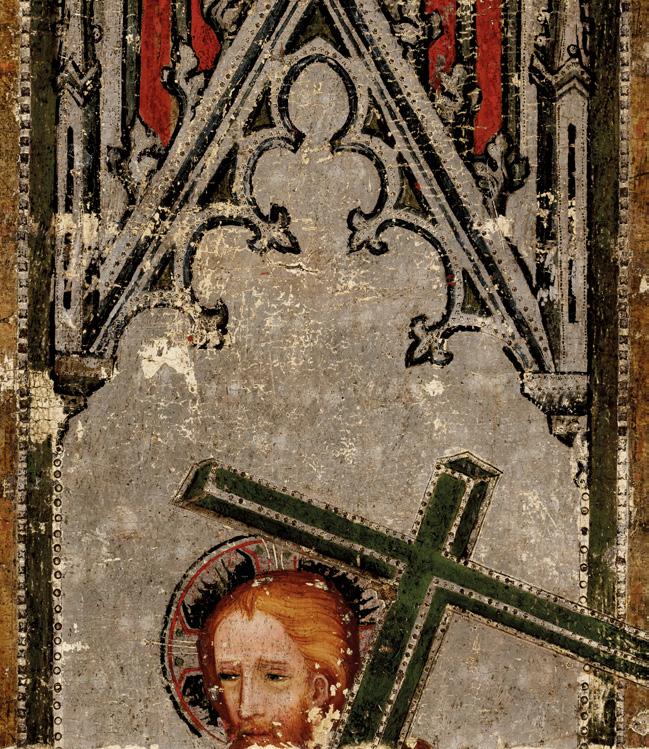
The Beatitudes are not a checklist to earn God’s favor. They are promises fulfilled in Christ and given to us through union with him. In baptism, we are “crucified with Christ” (Galatians 2:20) and “buried with him” (Romans 6:3). Every promise of Scripture is delivered through the cross to us. These include mercy, seeing God, and sonship. And they are ours today, not just in the future. The promises become present tense because we are in Christ! Remember, we were also “raised with Him” (Romans 6:4). Our union calls us to live as Christ in the world. We are to be agents of his mercy, forgiving as he forgave (Ephesians 4:32), pursuing purity in reflecting his holiness (I Peter 1:14–16), and making peace by reconciling others to God (II Corinthians 5:18–20).
This is our joyful response as God’s beloved children. God has sent “the Spirit of his Son into our hearts, crying, ‘Abba! Father!’ So you are no longer a slave, but a son, and if a son, then an heir through God” (Galatians 4:6–7). We live the Beatitudes not as slaves striving for approval, but as beloved sons who love their Father dearly.
Spend a moment reflecting on Christ’s mercy, purity, and peacemaking. How has his forgiveness touched your life? How does his purity inspire you to seek holiness? How can you be a peacemaker in your relationships, pointing others to his reconciliation? Pray: “Lord Jesus, thank you for fulfilling the Beatitudes and sharing their blessings with me. Help me to live as your agent of mercy, purity, and peace—not to earn your love but because I am loved by you. Amen.”
Hein, a seminarian, serves Trinity San Antonio in San Antonio, Texas. Artwork: “Christ Carrying the Cross,” c. 1350, Nuremberg Master, Städel Museum, Frankfurt am Main.
BY RENAH THOMPSON
ave you ever met someone who is immensely observant of the world around them, always noting and enjoying the details of nature? My mom and my 4-year-old nephew both pay remarkable attention to beauty. They savor the tiny bits of richness around them, focusing on the sparkling edge of a piece of glass or the intricate weavings of a translucent leaf. Life is clearer, lovelier, and more awe-filled through their eyes.
I’m fortunate to live on a stunning lake in Northwest Montana. Every day holds something astonishing to see or smell or hear. One morning I walked outside, and the sky and lake were utterly startling, the most vibrant orange and pink I’d ever seen. Today a boat in full sail was gliding across the bay, dwarfed by the blue mountains and as graceful as any swan. Other days I hear a veil of birdsong in the air, or the sweet wild smell of the cottonwoods grabs my attention. All it takes is opening my eyes, or ears, or heart. This is also true in places where beauty seems absent. It is never absent; it is only hidden.
Christian faith leaves so much room for wonder. I mean this in the sense of “awe-struck”—our daily lives are stuffed with the splendor of God’s creativity. Take even one minute to appreciate the intricacy, beauty, and glory of the created world; savor the rich texture of deep relationships or even kindness between strangers; and let yourself be filled with wonder at the good design of the world.
This thread of wonder runs through my experiences of
doubt, too. There’s hardly anything I don’t question. As I’ve mentioned before, sometimes I’m only sure of Jesus and his love, and everything else seems suspect. But when I try to decipher the doings of God or when I turn to intellectualizing my faith, I feel like Job “… I have uttered what I do not understand, things too wonderful for me, which I did not know” (42:3). It is good for me to acknowledge that God’s ways are far beyond my searching out. The ever-astonishing complexity and beauty of the created world is a reminder that God’s wisdom and ways profoundly transcend my intellect and ability to reason. Wonder gives the gift of humility.
Even more than wonder at God’s wisdom or creation, though, let me invite you to wonder at his burgeoning, expanding, vibrantly creative love. Consider: the life-giving God who made swallows and black holes and multi-eyed spiders (how strange and delightful) and designed the intimate details of your biology is the same God who, with his immensely wonderful love, has saved you. That same unstoppable creativity and wisdom express themselves in goodness toward you. May you, in the words of Paul in Ephesians 3:18–20, “have strength to comprehend with all the saints what is the breadth and length and depth and height, and to know the love of Christ that surpasses knowledge, that you may be filled with all the fullness of God.”
Thompson is a member of Faith Free Lutheran, Kalispell, Mont.